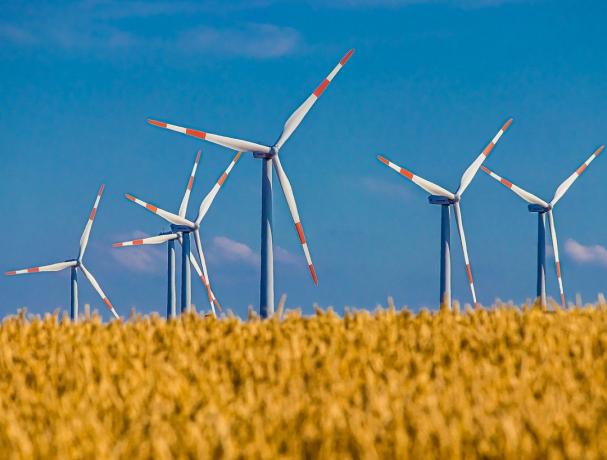Renewable energy is the designation given to the natural energy sources that manage to renew themselves, that is, never run out, for they are constantly regenerating.
Renewable energy sources pollute little or do not harm the environment, as they are considered clean energies, that is, they are provided by nature. Furthermore, its use does not contribute to the emission of gases or other toxic and harmful materials to the natural environment.
The alarming amount of pollutants released into the atmosphere, such as greenhouse gases, in addition to the imminent scarcity of fossil resources, such as oil, made the emergence and improvement of renewable energy emergencies.
Renewable energies are also classified as alternative energies, due to its guaranteed character (either in the present or in the future). Therefore, they are a source of sustainable energy.
On the other hand, non-renewable energies (such as oil and mineral coal, for example), have a limit in the world and it would take millions of years for them to be replaced again.
Renewable Energy Sources
The types of renewable energy existing in the world and which are most used today are:
Solar energy
The light obtained from the Sun, captured by ultraviolet and infrared rays, is transformed into energy, which is why it is considered an inexhaustible source. However, the implementation of solar receivers (photovoltaic panels) is still expensive, making it difficult to use them for large-scale energy production.
The sun's energy can also be harnessed through solar panels (heliothermal energy) and in heating systems.
 Panels that capture sunlight and produce energy.
Panels that capture sunlight and produce energy.
For more details, read about the solar energy.
wind energy
It is the energy generated from the wind. These are wind turbines that transform wind energy into electrical energy. Wind turbines are shaped like a pinwheel and produce and store energy. In addition to being a renewable source of energy, it is also clean as it does not cause pollution.
In fact, wind has been used for many years as a "fuel" for human engineering.
 Wind power mills.
Wind power mills.
Read more about wind energy.
Tidal Energy
It is the energy that can be produced from the waves and tides of the oceans. This is considered a very expensive energy medium to be deployed on a large scale.
It can be used in two ways, such as potential or kinetic energy. The potential energy is obtained from the differences in height between the tides (low and high), whereas the kinetics take advantage of marine currents.
 Tidal power plant that produces energy with the force of the tides.
Tidal power plant that produces energy with the force of the tides.
Hydro-electric energy
It is a source of energy that comes from the waters. Hydroelectric plants use the power of water to drive turbines that help produce electricity. This is the main source of renewable energy existing in Brazil, due to its large number of rivers.
For production to be efficient, the plants must be built in regions with rivers with a high volume of water.
 Hydroelectric power plant in operation.
Hydroelectric power plant in operation.
If you want to know more about the subject, see the meaning of Hydro-electric energy.
Biomass Energy
It is the energy generated from the decomposition of organic residues of animal and vegetable origin. The "fuel" extracted from this process is methane gas.
It is a clean energy source as it has little environmental impact.
 Biomass energy production plant.
Biomass energy production plant.
See also the meaning of biomass.
Geothermal energy
It is energy generated from the high heat that exists beneath the earth's crust, with temperatures reaching 5,000 degrees Celsius.
It can be used in three ways: in geothermal reservoirs, using geothermal fluids or using thermal water.
 The geothermal plant uses heat from the Earth.
The geothermal plant uses heat from the Earth.
Learn more about the use of geothermal energy.
Advantages and Disadvantages of Renewable Energy
Among the main benefits of renewable energies are:
- are inexhaustible
- they can be deployed anywhere in the world, without a centralization of resources, as happens with oil, for example, which has as its biggest reserve the Middle East region,
- lower production of damage to the environment compared to non-renewable energies,
- give more independence in energy production, as they use the natural resources present in the environment.
Between the disadvantages they are:
- some energy sources have high investment and installation costs,
- possible environmental damage, such as with the installation of hydroelectric plants,
- depend on weather conditions that may not always be predictable,
- not always the amount of energy obtained from renewable sources is sufficient for them to be the only sources adopted.
Renewable energy in Brazil
Brazil is a country with many natural resources, and the use of renewable energy represents almost 90% of the electric energy that is produced in the country, through hydroelectric plants, which use the power of energy hydraulics.
The country also began to invest heavily, from the beginning of the 21st century, mainly on the construction of solar receivers to produce energy from the sun's rays. In addition, in recent years, the country has also invested in wind energy production.
Brazil ranks as the largest producer of ethanol in the world, a fuel used as an alternative to gasoline, made from petroleum. Ethanol is considered a renewable fuel because it is made from sugarcane. Thus, half of the country's automobile fleet uses ethanol as an energy source.
non-renewable energy
Non-renewable energies, unlike renewables, are the ones that can run out, if used without control. Furthermore, they generally affect the balance of the environment more, and some of these sources are quite polluting and cause severe damage to ecosystems.
Examples of non-renewable energies are: oil, natural gas, mineral coal and nuclear energy.
Learn more about the meaning of non-renewable energy.


